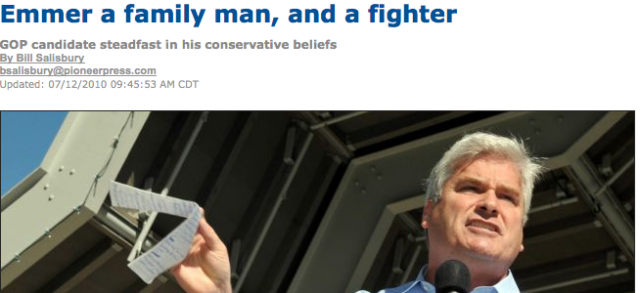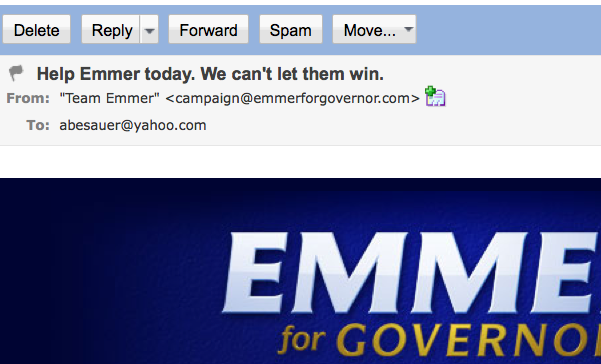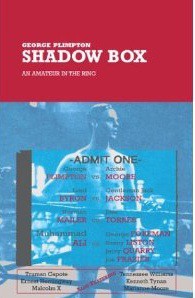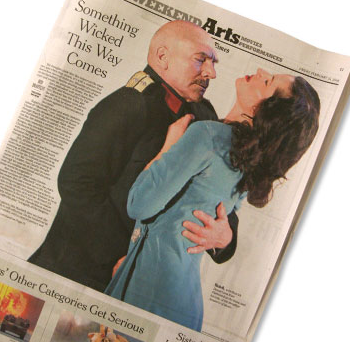Real America: Tom Emmer, Minnesota's Last Sovereign Individual
Real America: Tom Emmer, Minnesota’s Last Sovereign Individual
by Abe Sauer

As Minnesota governor Tim “T-Paw” Pawlenty gears up to rid himself of his characteristic Midwest abhorrence of touching other people so that he can run for president, the VW Beetle packed with clowns unloading to fill his vacancy as Minnesota governor is finally almost empty.
Candidate Tom Emmer is proving to be one of the more amusing. But don’t laugh.
A Minnesota House of Representatives member since 2004, Thomas Earl Emmer Jr.’s positions are jarringly reactionary for a state where even the right prides itself on some degree of progressiveness. Called “Minnesota’s most conservative GOP gubernatorial candidate in decades,” it’s no surprise he likes to play with guns, or at least give the appearance of doing so. Not only does he support the state’s allowance of concealed carry, he introduced the Firearms Freedom Act, exempting Minnesotans from federal rules or regulations on their arsenals.
Emmer wants to cut government services by at least 20 percent. But poor people vote too, so how did Emmer propose cutting service costs without having to outright deny poor people access to state assistance? He authored bill HR857, which mandated drug screening for Minnesota Family Investments Program eligibility.
But he can be fun too. Emmer also authored bill HF1131, which greenlights surgical or “chemical” castration of sex offenders. Naturally, he’s not just anti-abortion-he authored a bill that said Minnesotans had “no constitutional right to abortion.” And, despite blaming the media for many of his woes, Emmer’s name is on bill HF0936, allowing “News media representatives to enter polling places for up to 15 minutes during voting hours to observe the voting process” and “make a list of persons voting or not voting.”
While on the subject of democracy, during the 84th Legislative Session, Emmer’s name appeared on the author list of a “heritage” bill. It stated that all Minnesota school students will be taught the “world view of America’s founders; including documents that contributed to the foundation or maintenance of America’s representative republican form of limited government, the Bill of Rights, our free-market economic system, and patriotism.” This education should include, but not be limited to, “American or Minnesota state history or heritage based on religious references in documents, writings, speeches, proclamations, or records… Students may voluntarily choose to read, write, share, report, or otherwise study a topic which is religious in nature….”
That same session, tireless Emmer co-authored a common sense bill that designated cigarettes forfeited to the court during legal seizure to be delivered “to the commissioner of human services for use by patients in state institutions.”
Emmer says marriage “is the union between one man and one woman” and he supports the constitutional marriage amendment defining marriage as such. As a point of his “values” position, Emmer has been married to just one (presumably biological) woman since 1985. Meanwhile, claiming that it infringes on individual rights, he opposed the state’s indoor smoking ban. Displaying a complete lack of self-awareness, Emmer called one of these two issues “social engineering.” Can you guess which one?
Taxes? Boner killers. Ditto unions. Also, Emmer supports legislation that would allow pharmacists to decline contraception to whomever they deem unfit, an anti-family-planning position Emmer doesn’t just endorse, he lives: he has seven children.
Want to watch a conservative politician with gubernatorial aims, one who’s supposedly confident in his faith, squirm when asked if the earth is only a few thousand years old?
Most eye-opening is Emmer’s support of an amendment to the Minnesota Constitution that makes way for federal laws to be ignored at the discretion of the state. It defines Minnesotans as “sovereign individuals.” A seemingly tame little twist of diction that hides a revolutionary, some might say downright anti-United States, posture.
But does Emmer have a sense of humor? You betcha! Despite being a steadfast Republican, this Roman Catholic has sons named Jack, John, and Bobby.
Emmer is popular with the Tea Party and has its “official” support, as much as anything is official in the party’s terrorism-cell-like structure. Not surprisingly, he also has the support of Sarah Palin. She endorsed him as a “hockey dad.”
Emmer also has the support of the ironically-named “MN Forward,” an organization formed in the blast zone of the Citizen’s United ruling. In just three weeks, MN Forward raised over $400,000 from just four (4!) corporations: Polaris, Hubbard Broadcasting, Davisco Foods and the anti-Wal-Mart Minnesota liberal yuppie’s hometown retail favorite, Target. MN Forward is already running ads for Emmer (one of which has drawn accusations of Photoshopping away Emmer’s substantial girth).
Emmer is also the official candidate of the Republican Party and he looks the part. Thick necked and be-chinned, Emmer’s gray hair and bratwurst fingers give him the appearance of a Minnesotan who went to the fair and ate Taylor Hicks off a stick. In the 2016 Palin Patriot Network Tuesday Night Movie, he will be played by The Daily Show’s Rob Riggle. For many locals, in appearance and personality, Emmer embodies every water-sports asshole who ever fast-waked them at the lake.

As his fiscal-conservative, less-government rhetoric would suggest, Emmer is a huge proponent of the private sector as a solution to our problems (i.e., government). And he leans on his private industry bona fides to back it up. His official bio states that Tom learned “the value of hard work and the every-day pressures” from his father’s lumber company. That company is a 100-year-old business founded by great-grandpa Emmer, “Emmer Brothers Lumber.” What the bio conveniently glosses over about Emmer Brothers Lumber (actually Emmer Brothers Company), is that it filed for bankruptcy protection in the mid-1980s. In the few press reports that even bother to mention that the business failed, Emmer is conveniently allowed to say the company had “gone upside down” and that his dad was “struggling.” “Bankruptcy protection” is a term that generally gives fiscal conservatives voting booth rictus.
Now, take note, Poli Sci 101 kids, here’s how a right-wing candidate who hangs his coat on his business experiences spins it when that business is a failed one: Take the fact that Emmer Bros. Co. was bought, post bankruptcy, by Forest City Trading Group and renamed Viking Forest Products, which kept his brother Jack on as an employee, and sum it up as so: “Today it’s known as Viking Forest Products, with Tom’s brother Jack continuing in the business.”
Presto, a failed business with a (maybe charitably employed) brother is now a continuing successful family business from which our candidate has learned “first hand the value of hard work and the every-day pressures faced by employers and the families who count on them.”
Also, Marquette National Bank sued Emmer Bros. Co. for fraudulently concealing assets during the course of the bankruptcy proceedings. But whatever.
One could say this kind of slavish dedication to the “free market” is a family tradition. The Emmer family empire once also consisted of Emmer Brothers Dairy in neighboring Wisconsin. “You can whip our cream, but you can’t beat our milk,” went the motto. One might say these Emmers loved the free market too much, finding themselves indicted in a 1950 anti-trust suit which charged the dairy “illegally combined and conspired with intent to restrain competition in the retail and wholesale price of fluid milk in Milwaukee county, and by such combination and conspiracy actually did restrain competition and fixed and controlled the price of such milk.”
For the tea party set accustomed to things written on small signs, that means “price fixing.” Raymond Emmer was specifically named in the charge. Busted, Emmer Bros. cashed in and sold for a small fortune to Golden Guernsey Dairy, which, surprise, was named in the indictment as an Emmer co-conspirator. In a now familiar story that would come to replay itself years later, one of the Emmer founder’s sons was retained at Golden Guernsey for years afterward.
Ah, the free market.
So when Emmer says that big government spending will bankrupt America, it might just be the one area where he knows what he’s talking about.

Meanwhile, Minnesota’s Pioneer Press produced something indistinguishable from an advertorial: “Self-reliance is at the core of his laissez-faire political philosophy. No government handouts for the Emmers, and no government interference in economic affairs beyond the schools, roads and bridges, public safety and other limited services mandated by the state Constitution.” So did other media outlets-except they essentially were.
(With regard to the Wisconsin branch of the family: Emmer’s people told me, after I asked exactly what relation Tom was to some Wisconsin Emmers, that their candidate doesn’t know any of those people. That seems odd considering that during a 2007 Emmer family reunion, Emmer told the West Bend Daily News, “I love coming back. This is my third time.” The News also noted that Tom, who three years later doesn’t know any of those people, “had been on Saturday’s Emmer tour, which highlighted cemeteries, homesteads and churches frequented by past relatives.” When I told the kid on the phone, who’d been given the sad job of calling me and denying knowledge, that I already knew this from the Daily News article, he said he’d have to call me back. A day later, I received an email from Bill Walsh, Emmer’s Director of Communications, saying, “We are not going to comment on the issues you’ve raised. We don’t see the relevance to our race for governor in 2010.” The point is not the relevance of the Emmer family’s very loose connections to some small-time corporate malfeasance decades ago in another state, but that, if it was so irrelevant, why he reacted by denying knowing his own family.)
God knows, running for governor is a thankless business, not like the seductive senatorial campaigns, where candidates stump on sexy topics like health care reform, terrorism and offshore drilling. These are subjects on which one can talk jingoistically for an hour and not really say anything. Hopeful governors have to orate specifically and take unambiguous positions on mundane, sexless topics like sewage culvert location and deer hunting licenses. Some old spinster stops you during an event to talk your ear off about how her digital television reception doesn’t work anymore and you have to listen to her, really listen to her, intently-because if you don’t, the goddamn press is just dying to run a headline about how you ditched some old silver fox. And there goes your AARP support.
In a split state like Minnesota, every last vote counts (remember the Franken v. Coleman “Rumble in the Jünglen”?), so a gubernatorial candidate has to be all things to all people. He or she has to make a connection with people who love to complain about every. last. thing., from Minneapolis’ whiny Uptown hipsters to your huge corporate overlords to the Iron Range rednecks to the rod and gun set to the old people. Good Lord, so many old people. They’re everywhere and they bring highlighted printouts of your position statements!
Anyone who’s ever wanted to see the mystique sucked out of democracy, just attend a Tuesday morning meet-and-greet at the Chaska senior center where you can watch the candidate call bingo-an honor for which his volunteer advance team of interns had to beg.
Emmer’s local slog got some national attention when he celebrated America Liberty for Free American Americans Weekendâ„¢ by declaring that, should he be elected, the state would cut the minimum wage for all service employees who get tips. It seems Emmer had found a couple waiters who somehow made more than $100,000. Ever on the lookout for a new fictional archenemy of the The Hardworking American, Emmer declared waitresses and bus boys rich.
Besides never again being able to dine out with confidence, Emmer created a public relations disaster. The example of $100,000-earning waiters was soon after widely discredited. So not only had Emmer dug himself a PR hole, he had done it based on a fairy tale. Think about that: a gubernatorial candidate, the main choice of his party, took a matterless vacuum and created a campaign disaster for himself. Minnesota, you are witnessing true skill.
At first Emmer attempted to smooth things over with campaign emails stating, basically, “But wait, I won’t tax tips!” But then Emmer sucked it up and showed how in touch with The People he is by waiting tables for a few minutes.
That Emmer pulled this stunt at a place called “Ol’ Mexico,” despite his stated support for Arizona’s immigration policy, is the kind of joke one anticipates from a freshly-paddled frat boy, and, I suppose, that’s what he is. Not amused at the joke was the immigrant worker who dumped $20 in pennies on Emmer at a later “Server Summit” PR event, where Emmer was trying desperately to make kissy-kissy with all those he had earlier offended and then further offended by pretending to walk in their shoes.
But proving that he’s a keen study of Master Pawlenty, Emmer didn’t let the opportunity to bring up his hockey-playing days escape. (Get your fiscally sensible $200 Emmer hockey jerseys today, no discount for multiple orders.)
This guy might just have a chance yet.
Emmer has since moved on with his campaign focus. In the subject of a recent fund-raising email, he perfectly captured our nation’s 2010 midterm election theme: “We can’t let them win.”

Tom Emmer faces an uphill climb in the polls. That he wasn’t even born in Minnesota hasn’t hurt him. But, while he played hockey and he’ll remind you of that, it was for Boston College and U. of Alaska-both Gopher rivals. So how is he going to convince voters he’s truly ready to lead Minnesota as a Minnesotan? His two DUI charges are a good start.
Abe Sauer is an undecided voter.
(Photos via Emmer for Governor Facebook)
Ernest Hemingway Stories As Told By George Plimpton
by Jordan Carr

Since we’re talking about Ernest Hemingway today, as it would be his birthday-here are a few stories from George “And a hot plate!” Plimpton about the man.
Shadow Box is a book about boxing and literary people, and nobody occupied that nexus quite like Ernest Hemingway. The first scene takes place after Plimpton has just been taken under his wing by boxing trainer George Brown to fight Archie Moore, then the light heavyweight champion of the world. Having heard about this, Ernest gives George a call, asking him to visit at his hotel in New York City where he’s staying with his wife, Mary. Things begin awkwardly:
“Papa,” I asked, “what is the significance of those white birds that sometimes turn up in your, um … sex scenes? I’ve always…”
I mentioned this in a high, cheery voice, as if it were a natural enough matter to come up in conversation; actually it always had puzzled me, especially the white bird that flies out of the gondola in the love scene between the young princess and Colonel Cantwell in Across the River and Into the Trees.
He stopped and whipped around toward me and I could see that I had made a mistake. His whiskers seemed to bristle like an alarmed cat’s. “I suppose you think you can do better,” he shouted at me.
“No, no, Papa,” I said. “Certainly not.”
I noticed how small his eyes had become, suddenly, and bloodshot, as if affected by the flush of rage that showed on his cheekbones, and if I had not been carrying a very excellent picnic hamper of his with some wine left over in it and some cheese, he might well have bulled me off the dock into the bay.
The next day, things were no calmer, and after the Hemingways got involved in a rather contentious argument revolving around the number of lions they had seen on their last African safari, Ernest turned his attention to Plimpton.
He looked at me almost as if he had noticed me for the first time. Since lions were the nub of their dispute, that was the first quick impression-the big-cat character of the large grizzled head turning, the intense curiosity of that first formidable look, all of this compounded by the evident testiness, so that one had the forboding sense of what a gazelle must feel when he looks up to find a lion staring at him over a bush.
Hemingway pushed back his chair. Its legs shrilled on the tile floor and Christobal jumped off the table.
“Let’s see how good you are,” Hemingway said.
I had no idea what he was talking about. But then, as he came around the end of the refectory table, I could see he was assuming a semicrouch, his hands bunched at his waist, and I realized he wanted to spar-he wanted to take a look at George Brown’s pupil.
But of course it was something else, too; he was belligerent now, and he wanted to lash out at someone. Perhaps he remembered my impertinent question about the white bird the day before. I pushed back my chair and stood to face him-my hands up in front of my chin-and I put on a tremendous smile to indicate I hoped he’d calm down and all of this was going to be in good fun. I put out my left hand, flicking it an inch or so off his whiskers, to keep him away, and he stepped past quickly. His hands were rolled at belt level, and one of them came up in a left hook and I was banged hard alongside the head, past my guard, and I staggered backward and my chair went over. I felt the sympathetic response at work, the tears beginning to spring out; my smile wobbled; I moved around behind the fallen chair, keeping it between us, and I leaned over it and kept my left out. I noticed once again how small the eyes were in his face, and furious like a pig’s, and yet how surprising and utterly unnatural it would have been actually to hit out those whiskers.
So that’s how he had fun with his friends-by punching them in the face. Good times. Also, there’s the time he met Tennessee Williams in Cuba in 1960. Plimpton assesses how the nervous, eager to impress playwright did in their first meeting:
I don’t think the meeting went very well for him. Tennessee began by saying that when he lived in Key West he had known Hemingway’s former wife Pauline.
“How did she die?” Tennessee suddenly asked.
Hemingway peered at him in the gloom After a while he offered an explanation that seemed lifted from a freshman Hemingway parody: “She died and then she was dead.”
A silence ensued.
Hemingway later offered his take on Williams to Plimpton:
I think Hemingway was slightly puzzled by the encounter… He was thinking about Tennessee. “Not a predictable sort of man,” he said. “Is he the commodore of something … that yachting cap?”
I said I didn’t know. I doubted it.
“Goddamn good playwright,” Hemingway said.
Jersey Mayhem: High School Music Teacher Caught Pawning Instruments
Jersey Mayhem: High School Music Teacher Caught Pawning Instruments

As you would have been reminded by John Cafferty and the Beaver Brown Band had you been listening to the radio 25 years ago, things are tough all over. And as Bruce Springsteen might have reminded John Cafferty, stop ripping me off, you Rhode Island poseur, things are tougher in New Jersey than they are anywhere else. Sad evidence of that today, with word that Toms River High School North music teacher Albert Crosta was arrested Monday after selling $1,300 worth of school-property musical instruments to a second hand shop. Clarinets, a violin, French horn and cymbals, everything.
The news seems particularly crushing considering that, just last January, an Asbury Park Press article entitled “Toms River North’s Band Marches On” (opening sentence: “And the band played on…”) reported that “The school has never given into some people’s theory that rival school, Toms River High School South, eclipses it in spirit.”
Come this fall, at the annual game known locally as “The Civil War,” when North’s cheerleaders do their best to rouse the crowd to a fight song played on a single Casio keyboard (not unlike the one used so prominently in that John Cafferty song, perhaps), well, we’ll see whether or not “some people’s theory” indeed proves true.
The Key to 'Inception': It's a Movie About Making Movies

I should love to claim the credit for having figured out what Inception is really about, but Devin Faraci of C.H.U.D. is the one who started the ball rolling for me. I don’t know whether or not the essential clue was in Faraci’s possession before he wrote his review, but even if it was, all I can say is, dang. I can’t remember the last time a review succeeded in making me change my mind about a movie so absolutely, and so satisfyingly.
The clue is this: in recent a red-carpet interview, Leonardo DiCaprio compared Inception not to The Matrix or Dark City, but to 8½.
It’s the merest cliché, that a movie is itself a shared dream. The lights go down, and the audience shares a vision created by others. We are the real targets of the inception, here.
After I read the Faraci review, I had to go and see the movie again. And having done that, it now seems to me that Faraci did not go nearly far enough with the 8½ analogy. Like 8½, Inception is a movie about making movies; it’s not that the whole movie “is a dream,” though, but rather that the whole movie is an allegory of creation. It’s the story of Dom Cobb/Christopher Nolan, and his struggle with his own youthful, self-absorbed aesthetic in order to return “home,” where he can be united with his “real” children-his works, his films.
People have asked: why are the children generally wearing the same clothes, and why are they mostly the same age, throughout this movie? It’s because they’re the perfect vision of his creation, the ideal works of his mind’s eye; they symbolize the movies Nolan would like to make, or to have made.
The easiest way to access this interpretation is to examine the character of Mal, the wife of Dom Cobb. She represents Cobb’s personal inspiration; the Greek kind of muse, not just the beautiful-girl kind. Young artists conceive a passion for their métier that is analogous to a love affair. “He’s wedded to his work,” people will say. The indescribable beauty of books, paintings or music that strikes us with such brilliance and force when we are young; we fall in love with that. Some fall in love to such a degree that nothing will suffice but that they too must become painters, writers, musicians.
Young artists often come to feel that that great love will provide all the inspiration they’ll ever need to fuel their own works, that they can call on the muse and she will come, like a bolt of lightning, and then they will create works of equal brilliance out of the passion they’ve felt for the works of others. That feels inevitable, because the love is so colossal, so perfect, so overwhelming. Nothing so beautiful and fulfilling can possibly be mistaken; it is hard not to feel that.

But no artist who relies on passion alone is ever going to create meaningful work, it turns out. The world of personal inspiration is sealed to the outside. In the movie Mal, the symbol of inspiration, says this directly to Ariadne: “Do you know what it is to be a lover? Half of a whole?” Please note, there is no room for children or anything else in that formula. Then, to Cobb, in distress: “You said we’d be together! You said we’d grow old together.”
(By the way, in Greek mythology, Ariadne provided Theseus with the ball of thread or “clew” he uses to escape from the maze after slaying the Minotaur, you will recall. This Ariadne is the same.)
The artist has to struggle and eventually to break with his muse, however seductive and beautiful she may be, if what he wants is to move an audience. The muse will always be tempting him to indulge his own vision, rather than trying to reach outside himself for it. This is the real story of Inception.
The deficiency of pure inspiration is illustrated quite baldly in the first scenes with Mal, at the cocktail party of Saito, the tycoon (or, studio honcho) whom Cobb is hoping to persuade to hire him. Cobb asks her to sit in a chair; he’s begun to fashion his illusion for Saito, in furtherance of which he fastens a rope to the chair’s leg, and then uses the rope to climb down the outer wall to a lower window. Stay there, he tells her, before he pops out the window. Mal immediately displays the caprice and unpredictability of inspiration: she betrays him instantly, lets him fall. We see her empty chair, the fleeing rope, and Cobb plummets far lower than he’d intended. He can’t rely on inspiration to help him get where he wants to go. This disturbs him, but it doesn’t stop him; he climbs up to the intended window, muse or no muse. He has a larger purpose, one that doesn’t include Mal.
Eventually that purpose will lead Cobb to Fischer, who represents on one level you, a single viewer, and on another, the audience and the culture at large. It’s Fischer that Cobb must reach in order to “go home.” Tellingly, Cobb doesn’t care much about Fischer, to begin with. But by the end he is fully invested in Fischer’s responses to all his machinations. As “Mr. Charles,” Cobb takes the risk of revealing to Fischer that they’re both in a dream. That’s like letting you know that you’re watching a movie; a directorial aside, a lifting of the curtain. There’s a leap of faith required from Fischer, too. When he makes that leap, even though Cobb is deceiving Fischer, it’s as though Fischer’s story has now got a certain hold on Cobb; now Cobb cares about Fischer, and will even dream Fischer’s dream, in a sense.
By the end Cobb will have to choose, explicitly, between Mal and Fischer. This is a very exact analogy: who are you doing this for? For your own vision, or for the audience? By then, reaching Fischer has created its own justification for undertaking such a risky enterprise. For Fischer’s epiphany, however artificially-induced, however staged, is strangely moving, beautiful and sad: it’s real, for lack of a better way of putting it. Note also that it comes to Fischer alone. Cobb doesn’t see this redemption; he only has to have faith that it’s happened. How sad it is that no director can ever really see into the heart of a viewer who is seeing and understanding his work for the first time!
As much as I like Faraci’s conceit of the various characters mapping to the various roles in a film production, it also appears that Nolan is a total auteur who writes all his own stuff. He’s married to his producer, even. So I prefer a reading where the different roles here are played by the different parts of Nolan’s own psyche (not that these readings are mutually exclusive; far from it.) In this case Arthur represents the director’s reason, experience or conscience-as well as the idea of “producer,” Eames, the “thief and forger,” represents daring, playfulness, invention-”actor”; Yusuf, the technical, illusionist’s part-”production design”; Ariadne represents craft, curiosity and intuition-and, perhaps, “writer.” (One need not even mention the striking resemblance of the film’s star to its director.)

All these are played off against the Other represented by Mal. She is the enemy, here. Why? Because the Muse wants only Cobb, Cobb alone. She could care less about anything but the private magic between them-not even their children. Their “real” children, she claims, are beyond the veil. So Cobb’s destruction of Mal provides the real climax of the movie.
“Fischer is real,” says Ariadne, the leader out of the maze. “Mal is just a projection.” Cobb has to follow Fischer, whose catharsis is now revealed to be the real reason for Cobb’s work, down into the deepest part of himself: the intuition that guides his craft (in the form of Ariadne) leads him to believe that success can be achieved, Fischer reached (and all brought out of the maze!); otherwise even Cobb himself would have given up.
Cobb goes home, where his mentor and father-in-law Miles is waiting with his “real children.” (It’s no accident that Cobb first meets up with Miles in Paris, the old capital of art, and of film, and then he magically shows up at “home.”) Cobb sees his children’s faces for the first time in the movie and, also for the first time, he doesn’t care whether or not the top, his totemic indicator of “reality,” ceases to spin. Audiences have been moved to speculate on the ultimate fate of the top, as if what were being said is merely that “reality” is in question. Which sure, that is being said. But the real point is that Cobb leaves the top spinning, in order to go outside and find his children waiting for him. Whether or not reality is “real” has stopped mattering to Cobb, and that final leap of faith is what redeems him.
All the seeming inconsistencies that bothered me on a first viewing evaporated instantly on the second, after I had read Faraci’s review. Every line of the movie finds its place, viewed through this lens. Take Saito, the studio executive who is willing to give Cobb a job, but just a job isn’t enough; Saito must tempt Cobb with the promise of reaching his children: creative autonomy. “How do I know you can deliver?” Cobb asks, and Saito responds: “You don’t… but I can.” That didn’t mean much to me when the players were rival titans of industry, but when I saw Saito as a studio head extending the offer of creative control to the director of the movie I was watching, whoa. And line after line, it was the same.
“A man possessed of radical notions.”
“The world needs Robert Fischer to change his mind.”
“How do you translate a business strategy into an emotion?”
The most fun part of this whole thing is that Nolan’s attempt at Inception has worked really beautifully, so far. He’s made an idea, “like a virus,” enter millions of minds, and we don’t quite know what it is, not yet.
Maria Bustillos is the author of Dorkismo: The Macho of the Dork and
Tom Vilsack Should Consult Young Jeezy About The Shirley Sherrod Situation
The USDA is no stranger to racial controversy, but they’ve made the right decisions as far as employment policy before. This 2007 video, unedited by Andrew Breitbart, proves the department has a history of showing loyalty to deserving employees. Fair is fair.
Why New Yorkers Should Still Be (Kind Of) Excited About The Knicks
by Bethlehem Shoals

I could have changed the history of the city of New York. Back when the Mayor was busting his pockets trying to land the NBA’s prime free agent-back when anything was possible and any team could land LeBron James-I got recruited to help. A friend of a friend asked me to select soundtrack for part of the campaign, presumably because I write about basketball and the perils of Ikea’s Expedit, exclusively.
But journalistic ethics got the best of me, and I politely declined. So if you’re still looking for a scapegoat, I’m your man.
In the end, though, I’m happy with how things turned out for the Knicks, and you should be, too. That’s kind of my specialty: convincing fans that their uneven, flighty team is in fact a thing of beauty. And, with a dark age about to fall where next to no team, other than Miami, has a shot at a title, this kind of off-beat charisma and a sense of danger is about the most you can hope for. Forget the competitive pressures of playing in New York; in large part, New York City athletes just need to justify their celebrity status.
Many will miss David Lee, even though studies have shown that the man never was, and is unlikely to ever become, Jewish. Amar’e Stoudemire has at least made a valiant effort over the last few days, vowing to travel to Israel and issuing a guilt-laden statement about leaving Phoenix. He also instinctively gets that the bigger the personality, the easier a Knicks team can divert attention from its play-and build up its own kind of legend. As in, Danilo Gallinari is now free to go from franchise player to sneering, three-point drilling I-talian growing up in public.
And then there’s Anthony Randolph.
Randolph is the quintessential NBA cult figure: lost, found, and pitied back into oblivion several times over after only two seasons in the league. As a player, his skills are limitless. Coach Mike D’Antoni talks about the twenty-two year-old like Weapon X; if Amar’e is like a volcanic eruption around the basket, and Gallo a tall, hot-and-cool international emissary, Randolph is several thousands theories of basketball colliding in the same place at the same time. He’s a 6’11” gawky slingshot of a player born on the wrong side of the Berlin Wall, drafted out of LSU in 2008 after one inconclusive year, and projected as a raw, bouncy beanpole. Instead, within weeks he revealed that he could pass, handle, and terrify all manner of opponents with his shot-blocking and speed-demon response time.
Randolph has been picked up and discarded by, almost simultaneously, both the notoriously gut-driven Bill Simmons and the statistics electorate at Basketball Prospectus. On the court, he was busy being yanked around by washed-up innovator Don Nelson, dealing with injury, and generally lacking the guidance to turn raw promise into the 21st century version of Lamar Odom or young Kevin Garnett. Odom predicted the kid would surpass him. You also have to imagine KG nodded with approval when one night, Randolph became so worked up, so distressed, he went to the bench just to cool down his core temperature. There were tears, fumes, grimaces of anguish, and the sense that if the future ever arrived, it would destroy us all.
Now Randolph has gone from Nellie to fellow avant-gardist D’Antoni-who, incidentally, is desperately seeking to prove he’s still relevant. Maybe Mike D, who once predicted a future where everyone was 6″9′ and could pass or shoot, sees Randolph as his chance for redemption.
The Knicks should crack .500 and have a brief taste of the postseason. Raymond Felton, the most beloved Tar Heel of the last decade, hasn’t thrived as a pro. But he has to be better than Dookie Chris Duhon. Nature demands it. And, as for all the “who plays the off-guard?” blather, let me introduce you to Kelenna Azubuike, another seeking refuge from Nellie’s chaotic whimsy. The Knicks should have traded Wilson Chandler when they had the chance, just like Channing Frye before him. Hope dies hard in this town!
With world domination off the table for the time being, though, this is a chance to watch a team laden with intrigue light up (and occasionally tear down) the Garden. That’s got to be worth something, right? If you don’t see, the exuberant Ronny Turiaf will light the way. And he will lead you straight to Randolph.
Anthony Randolph, it’s all on you. Your revival-if you ever really arrived in the first place-is the key to the city’s sanity. Or at least its distraction. Forget about Randolph’s potential on the court; to whom does such a man get linked romantically?
Bethlehem Shoals, a regular contributor to NBA FanHouse, is a founding member of FreeDarko.com, whose Undisputed Guide to Pro Basketball History will be published by Bloomsbury, USA in November.
Statue Of Liberty Not On Fire
The Statue of Liberty was briefly evacuated today after a faulty sensor in an elevator shaft falsely indicated smoke. While there were no immediate reports of injuries, the very idea that someone might build a Muslim community center just across the water from the site of that undamaged sacred ground was compared to a stab in the heart by a bunch of racist yahoos.
The Job Board: Have a Job? Want One? Inquire Within!

I’m trying an experiment here. Do you need a job? Do you need an employee? Well come in and explain yourselves! What happens if we throw this post open, make it sort of like the corner by a Home Depot in the mornings, and see what results?
What It's Really Like To Be A Copy Editor
by Lori Fradkin

The word is douche bag. Douche space bag. People will insist that it’s one closed-up word-douchebag-but they are wrong. When you cite the dictionary as proof of the division, they will tell you that the entry refers to a product women use to clean themselves and not the guy who thinks it’s impressive to drop $300 on a bottle of vodka. You will calmly point out that, actually, the definition in Merriam-Webster is “an unattractive or offensive person” and not a reference to Summer’s Eve. They will then choose to ignore you and write it as one word anyway.
I know this because, during my three-plus years as a copy editor, I had this argument many, many times.
When I left to take a non-copyediting position at another company, I sent an e-mail to some of the editors telling them to spell it however they wanted going forward. I no longer cared. Which was kind of the case to begin with. I never had a personal investment in that space between the words, but as part of my job, it was my duty to point out that it should exist. It was a job that suited my tendency to worry about details, but one that also forced me to engage in unexpectedly absurd conversations.
I pretty much knew I wanted to go into journalism since I served as an editor on my high-school newspaper, the Three Penny Press, but what exactly I wanted to do changed throughout the years. Initially I thought I wanted to work for People, but then I realized that I am way too shy to approach famous people and ask them about their personal lives. Also, my desire to be their best friend would likely interfere with my ability to do objective reporting. Then I decided I wanted to work at a fashion magazine, a dream killed by The Devil Wears Prada, a friend’s internships in the industry and the acknowledgment that I’m not very good at putting clothing combinations together. (I like dresses for a reason.) But starting at some point in college, I aspired to one day, fingers crossed, work at New York magazine. I was a faithful subscriber, despite living in Evanston, Illinois.
It was my one-day-if-I-work-really-hard goal, but when I did the requisite round of informational interviews for jobs in New York, I paid a visit there as well. I was introduced to the copy chief, who oversees fact-checking and copyediting, and I mentioned that I was far more interested in the latter. The former, with its inherent asking-questions-of-strangers, makes me incredibly uncomfortable, even when it’s just “Are you still located at 123 Some Street?” Plus, I’d always had an eye for error: When one of my best friends in elementary school asked her mom what “f-u-k” meant because she’d seen it on the door to the bathroom stall, I helpfully jumped in: “I think you mean f-u-C-k.” You’re welcome, Friend’s Mom.
All of this is to say that I never necessarily aspired to be a copy editor. I enjoyed the experience-seriously, your job is to sit and read articles-but when my day-camp counselor asked me what I wanted to be when I grew up, I did not tell her that I hoped one day to correct who-whom mix-ups or determine whether “faucetry” was a real, dictionary-approved word. I told her I wanted to be a princess.
The job has its perks-an accumulation of random knowledge, for instance-but it also has its side effects when you unintentionally drink the copy Kool-Aid. Once you train yourself to spot errors, you can’t not spot them. You can’t simply shut off the careful reading when you leave the office. You notice typos in novels, missing words in other magazines, incorrect punctuation on billboards. You have nightmares that your oversight turned Mayor Bloomberg into a “pubic” figure. You walk by a beauty salon the morning after you had sex for the first time with a guy you’ve been seeing and point out that there’s no such thing as “lazer” hair removal, realizing that this may not be the best way to get to have sex with him again.
Another downside of the job is that only your mistakes are apparent. The catches are basically invisible. No one will look at an edited article and think, I am certain that, once upon a time, there was a double quote where there should have been a single, and a wise person fixed the issue for my benefit. But if you let a “their” slip through in the place of a “there,” you are a complete moron. And if you are working online, commenters will let you know so. Then your boss will let you know that the commenters are saying so in case you didn’t see it yourself. Also, people will want to talk to you-outside of work-about grammar. Aside from the guy who called me “awkward, in a cute way,” I think the worst line I’ve heard was from the dude who asked my thoughts on the serial comma.
When you edit for the Web, you always feel like you’re playing a frantic game of catch-up. Editors may schedule posts to publish at a certain time, and your goal is to give them a read-through before they go live. You don’t leave your desk much. Once, however, we had a company-wide meeting, and I had to let things go unfinished. A co-worker could tell I was antsy about being away and taunted me that there might be typos on the Internet. This immediately struck us as funny because of course there were typos on the Internet-I just didn’t want them on my Internet. It’s also how I got the name of my future band, Typos on the Internet, for which he bought me a T-shirt (complete with a keyboard design) as a farewell present.
Still, despite all the rules, sometimes you get to make decisions regarding, um, unexplored territory: In February 2008, the New York Times ran an article on the cover of its “Arts & Leisure” section about a production of Macbeth starring Patrick Stewart. The piece was accompanied by a huge picture of Stewart embracing his co-star, Kate Fleetwood, in a moment of rapture. Both have their eyes closed, her face is turned upward, and he has one hand on her back pulling her closer. Only a sliver of his other hand is visible, and it appears fairly low on the front of her body. It could be read as if the rest of it were occupied, and the editor of the culture blog was quick to see the humor. He was equally amused by the fact that, as a result, I would have to tell him the proper way to punctuate the verb “finger-blasting.” Was it hyphenated? One word? Two? What would it be in noun form? After more discussion of the matter than is probably appropriate in a work setting, I made an executive decision that it should be hyphenated. This proved unexpectedly helpful for tagging posts when, months later, Don Draper finger-blasted Bobbie Barrett outside the powder room on Mad Men.
Not that pop culture didn’t try again and again to subvert me. My head still hurts a little when I think back to an article I edited about The Curious Case of Benjamin Button. The writer was trying to describe the combination of physical appearance and actual age of Brad Pitt’s character at various points in the movie. It took possibly as long as the movie itself to determine that the just-born Benjamin would be an old-man baby (that is, a baby who is like an old man) and the almost-dead Benjamin would be an old-baby man. I think? Honestly, I’m still not sure if this is right.
Thank God I was just a kid when Prince turned himself into a symbol, but musicians continue to think it’s cute or edgy to defy convention with their names. The day Panic at the Disco (né Panic! at the Disco) dropped that stupid exclamation point was one of my happiest as a copy editor. I felt so undeservedly victorious that I wrote a blog post about it. It began like this:
Late last week, in a development sure to shake the rock-and-roll and copyediting worlds, the band Panic! At the Disco announced that it was dropping the exclamation point from its name. “At least for me, it got a little bit annoying to try to write that every time you’re typing the name,” guitarist Ryan Ross told one of MTV’s two! reporters. “It was never part of the name to us.” Wha? The punctuation didn’t matter? “We wrote it that way once, when we first started the band, and then … people kept writing it that way, and it was a freakin’ whirlwind,” explained singer Brendon Urie. “We never made a big deal out of pulling it off the name. … I mean, every time I write [our name], I never put an exclamation point in there.”
Not that they came up that often, really, but that random mark had always annoyed me. The fact that they never meant it to be there was infuriating. (By the way, that “wha?” is a joke, not a typo.) Nevertheless, I went on to commend them for this announcement, even forgiving them for calling their latest album the awkwardly punctuated Pretty. Odd., and to plead for other musicians to follow their lead:
We only pray will.i.am., moe., and !!! will follow suit.
It’s like !!! never thought, Hey, what if someone wants to Google us!!! But they clearly didn’t read my piece or rudely chose to ignore it, sending a message to people like Ke$ha that kreativity is kick-a$$. (Beyoncé, on the other hand, deserves praise for her grammatically correct “If I Were a Boy”-because she’s not really a boy, you see? It’s a statement contrary to fact.)
To be fair, it’s not just famous people who are guilty of taking such liberties. In the past few years, my own university-educated sister has started spelling things semi-phonetically or with added letters for emphasis. She’s not tired, she’s tiyad, and sometimes even tiyadddddd. The word has appeared in text messages and e-mails so often that it’s become a family joke. Like I will tell my mom that it’s been a long week and I am very, very tiyad. I have also learned from my sister’s e-mails that not only did my little cousin look “omggggg adorabull” in his baseball gear but the planned fried-chicken addition to a restaurant’s menu sounded “yummmmmmmmmmmmmmmmmmmmm.” She was both wrong and totally right on those.
I left the New York gig when the work started to feel routine. I still loved the publication and web site-Website?-but it was really only challenging in terms of how much content I had to go through in a short period of time, a fundamental conflict for the role. I feared my ability to do critical thinking was fading, so I got a job that required me to brainstorm ideas and figure out which stories to run rather than just clean things up in the end. I swore I wouldn’t let errors slip by if I saw them, but I also wanted to move on from my former role. That this plan failed is evidenced by the fact that my team now refers to a particular headline structure as the Lori Rule, as in “I think that breaks the Lori Rule…” They also IM me to ask how to spell things, even though all I’m going to do is look them up in the online dictionary. Of course, when a co-worker recently wrote me to say she had a copy question, I hastily responded with, “That’s what I’m hear for.” Sigh.
I know it’s all a little once-a-copy-editor-always-a-copy-editor, but I can’t help it if I think unnecessary quotes are funny, as if signs are trying to be ironic. Or if I’m turned off by guys who spell it “definately.” I don’t sit around and diagram sentences for fun or keep a dog-eared copy of Strunk & White on my nightstand. But I continue to empathize with other copy editors when I spot typos in their publications because I’ve definitely been there. Except when the New Yorker didn’t catch “Chris Mathews.” That was funny.
And, yes, I realize that writing a whole essay on copyediting is basically setting myself up to be called out because there is likely an error in here somewhere. You know what? It happens. If you want to tell me about it, I’m all ears. Just don’t be a douche bag.
Lori Fradkin is an editor at AOL. She lives in New York and worked previously at New York magazine.
Old Spice: The Original Consumers Speak
“If they really want to sell any Old Spice now, they’re going to have to do ads like that ‘Axle’ one.”
–Men in Wisconsin retirement community interviewed about Old Spice’s new ad campaign.
